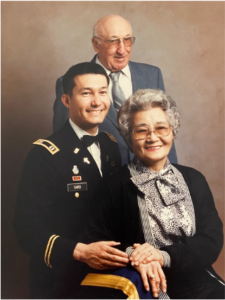
“Music is a universal language of the heart,” are words eloquently expressed by Chaplain Charles “Chuck’ Card in PHM’s weekly “Bits of Encouragement” newsletter. Perhaps in telling his narrative, it is most effective to begin his story in this way; the quote a testament to a childhood spent growing up in a household that music brought to life. Born in Japan, Card fondly recalls memories spent with his father, who played the accordion, banjo, harmonica, and mandolin. His early adolescent years serve as the blueprint that would inspire a life dedicated to healing through music. His work is born from the very philosophy with which this profile opens. If spiritual restoration is the goal, music is the means through which it is most effectively achieved, one ukulele strum at a time.
Chuck undoubtedly paints music with a kind of reverence most intimately understood by those who have benefited most from its potential to heal. It possesses a sort of uncanny ability to vibrantly define moments in our lives that time refuses to let us forget. In fact, he recalls a particularly influential moment with Kosuzu, the first seat guitar player of the NHK band, NHK being Japan’s public broadcaster. After his mother and Kosuzu sparked up a friendship, he invited a young Card to visit him in the studio. During this time, the impressionable future Chaplain would subconsciously commit himself to a lifelong attachment and interest in the arts after being handed a guitar.
After his father, a Chief Warrant Officer, retired from the Army, his family would relocate to Oahu in 1966. Chuck then around the age of eleven, would find his initial time in the islands marked by constant relocation, attending three different elementary schools within a year. Eventually, he would find a home in the Waipahu school district where love and passion would reign for music, particularly its performance. He played the trumpet as a member of the high school band. Furthermore, in 1972 he was notably a part of the OIA half-time show when his school’s football team became the reigning champions.

While blossoming as a budding musician, he notes that he also “came alive” spiritually during this period. After attending a Five-Day Bible Club for the first time, Chuck would begin to find his longstanding feelings of emptiness disappear. As he explains, “I [always] enjoyed studying spiritual things. Spirituality gave me a purpose and meaning I never felt before. Prior to my religious experience, I felt something was missing in my life.” While faith most certainly gave way to a sense of fulfillment, it would also cultivate a sense of purpose. After graduating high school, he would attend Leeward Community College (LCC) and ultimately graduate from the University of Hawaiʻi.
In a move that would forever change his life, Card, while taking a speech class at Leeward Community College, would be presented with the opportunity to improve his grade and give an impromptu address about religious faith. While initially skeptical based on the professor’s intimidating demeanor, he eventually decided to give it a try. The result would be widespread praise from his professor and classmates that would ultimately, as Card notes, give him the validation and “confidence I needed to pursue a spiritual career leading me to [becoming a] chaplain.” With destiny making its mark in his life, Card would pursue a career as an Army Chaplain inspired by his mother’s encouragement.

He fondly recalls the opportunities of travel and diversity of experience that the military offered with a career spanning over twenty years. Serving across different continents, he would provide “spiritual care for soldiers, families, and communities [while conducting] chapel worship services” in Germany. His time serving in the states, particularly Fort Jackson, South Carolina, and Fort Hood, Texas, would serve as pioneering examples of the gratification that comes from spiritual servitude. While his station at Fort Jackson would call him to assist the most vulnerable, basic trainees grappling with adjusting to military life and expectations, the commonalities between his service here and Fort Hood are undeniably important. What is perhaps most significant about these two locations is the demonstration of how powerful religion is in regards to encouraging collectivism and spiritual restoration, especially across diverse communities.
Chaplain Chuck is particularly appreciative to PHM of its assistance in transitioning from military to civilian life. Through PHM, Card not only received hospital training through the CPE program and job opportunities, but has found a way to merge his two passions: being a religious and musical resource. Discovering his love for playing the ukulele fifteen years ago and inspired by Sonny D’s spiritual reverence for the instrument, he currently conducts musical classes in which he performs and participates in a sort of culturally attuned healing with those in need. Strumming classics like “Let it Be,” “Que Sera Sera,” and “Over the Rainbow,” Chuck innovatively ushers in, and caters to, the spiritual needs of even the most religiously unfamiliar…one melody at a time.
